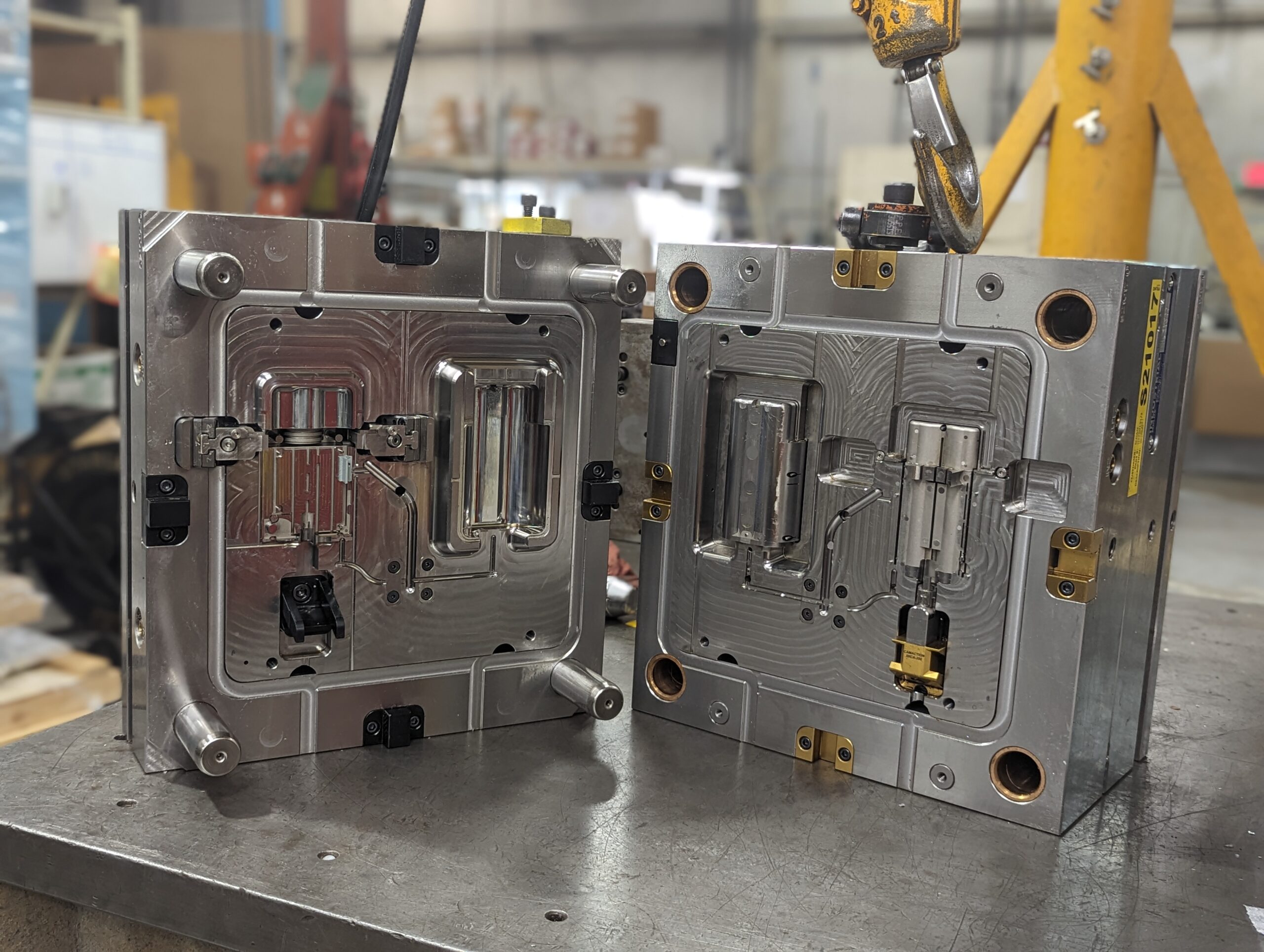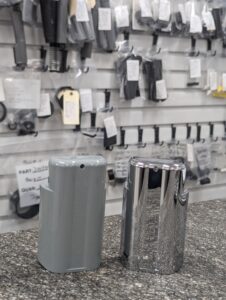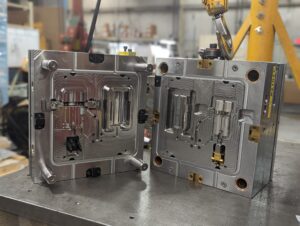
By Shelly Otenbaker, president, WayPoint Marketing Communications

Throughout the past three years, the manufacturing industry has experienced a series of challenges that have made it difficult for companies to remain competitive and, in some instances, keep finished goods in the marketplace. As a result, it has become increasingly more important for manufacturers to streamline and fortify their supply chain to eliminate risk and better manage demand.
Many businesses already have, or are considering, relocating secondary work closer to the origin of production, often referred to as “reshoring.” In fact, according to a report from The Reshoring Initiative, approximately 400,000 manufacturing jobs in 2023 were announced to be added in the US due to reshoring and foreign direct investment. This represents an 11% increase from 2022.
Due to these unprecedented times and ongoing geopolitical challenges, many US-based manufacturers are looking at every aspect of their operations, including supply chain, to ensure they can cost effectively meet demand. What worked in the past may not work today. Reshoring or transferring work closer to its origin are options that can reduce risk, ensure stability and, oftentimes, improve efficiency. With available capacity in the mold building industry hovering between 71% to 72%, according to AMBA’s 2023 Shop Rate Report, reshoring provides an opportunity to strengthen the domestic manufacturing industry and benefit mold builders and molders.
Illinois-based Industrial Molds – a highly automated, state-of-the-art mold manufacturer and part of Pyramid Molding Group – has capitalized on the instability in the manufacturing marketplace by securing business that previously was completed in low-cost countries.

Case Study: Industrial Molds Collaborates with Sloan
Sloan, a manufacturer of water-saving commercial bathroom products based in Franklin Park, Illinois, was searching for a supplier to support the company’s need for a 14-tool package, including complex tools for a product with Class A finishes. The company was familiar with sourcing tooling in China and other low-cost countries, but for this situation considered a two-pronged approach – quoting the whole package overseas and splitting up the package to multiple vendors to ensure cost, quality and lead-time targets
were met.
“We have extensive experience with building molds for complex parts and managing secondary operations, so we felt we could meet Sloan’s needs,” said Andrew Peterson, chief operating officer, Industrial Molds. “We never say no. Our knowledgeable team of problem solvers always finds a way to deliver, so we were confident we could help Sloan.”
As it does with all customers, Industrial Molds collaborated with Sloan to understand the project’s requirements and key concerns. Knowing the complete picture, Industrial Molds developed a unique solution that leveraged the company’s expertise and partnerships. By collaborating with Pyramid Plastics – also part of Pyramid Molding Group – and identifying an industrial plating partner, Industrial Molds’ solution included mold building, molding and plating. For Sloan, this would mean a competitively priced finished part produced 100% in the US.
In addition to providing a single source for the project, being located in the same state meant Industrial Molds was able to eliminate time zone complications, address issues and conduct product reviews in person throughout the project.
Sloan was looking for a partner with the ability to meet its high-quality standards and compressed timeline – two critical componets. These were no problem for Industrial Molds.
Quality – The specific part needed to be molded and then chrome dipped, a process that would highlight any imperfections. To meet Sloan’s requirements, the part needed to be “perfect.” Understanding this, the Industrial Molds team worked with Sloan to design a mold that could provide the correct fit and finish, and made adjustments throughout the process to ensure the required quality was met.
Timeline – The initial timing of the project was five months from kickoff to fully approved production part, which included compressed deadlines. To address this, Industrial Molds created a project plan that leveraged the company’s technology, unique scheduling process and experienced team.
“During the COVID-19 pandemic, we made adjustments to our operations that improved efficiency and our ability to deliver molds with reduced lead times,” said Peterson. “Since making those operational changes, our workforce is more productive and turnaround times have improved, leading to an increased throughput of 31%.” Peterson added that a key to meeting this metric was a “mind shift” in the way the company tackled in-house work. Instead of working on several projects at the same time, the company focused on fewer projects but with greater time, energy and resolve. This strategy has served to increase production and decrease turnaround time on molds.
There are many benefits to building molds and producing parts near locations where final production and assembly will occur. As the price gap between domestic and low-cost country manufacturing shrinks, mold builders and plastic processors can benefit from reshoring. The Sloan/Industrial Molds project is just one example of a project where reshoring resulted in both companies achieving success – an on-time, high-quality product.
“We strongly feel that collaboration was the solid foundation for Sloan selecting us as a partner. We were able to eliminate the complexity of multiple suppliers, as well as time zone and language challenges. In addition to all that, we established a relationship built on transparency, trust and communication,” added Peterson.
While the Sloan project is a reshoring success story that highlights how Industrial Molds was able to think differently and still deliver value to a customer, it’s not its first. Since 2020, Industrial Molds has leveraged its key differentiators to identify and secure a significant number of reshored projects. In fact, approximately 35% of Industrial Molds’ business today comes from reshored projects.
“We will continue to pursue business that fits our niche,” said Peterson. “It is our goal to add value and wow the customer with our service and quality products. Right now, we see reshoring as an opportunity and are working to continue capitalizing on it.”
Preparing a Business for Reshoring Opportunities
Mold building is and will continue to be a very competitive industry. And, while many things also are evolving in the industry, one thing remains constant – price always will be a factor. However, there are steps that can be taken to improve a shop’s competitiveness and create a compelling business case for reshoring.
First, look for improvements within internal operations: What steps can be taken to eliminate waste, improve the teams’ efficiencies and make the most of existing equipment? Also, look for opportunities to invest in technology – automation or software – that can streamline the mold building process or allow the team to do more with less.
Next, leaders need to be innovative in the way they bid on business. What are ways the company can deliver more value or a better solution than overseas manufacturers? For example, think about identifying strategic partners that can help create a niche or expertise in a specific area while ensuring security of product designs and intellectual property.
Finally, help customers recognize and understand the value in reshoring their mold building to the US – eliminating additional project management and transportation costs; mitigating the negative effects that a poor-quality part can have on cost and reputation; and reducing extended timelines related to transportation and/or mold repairs, just to name a few. Although these may not show up in the initial quote, they can be incredibly costly factors when working with low-cost countries for mold building needs.
Recently, the only consistent factor in manufacturing is the ongoing chaos. Unfortunately, it is not predicted to change in the near future. This is why companies in the North American plastics industry need to find ways to maintain their competitiveness while meeting the growing demand of customers. Reshoring is one of those ways.
Shelly Otenbaker is president of WayPoint Marketing Communications, a full-service marketing communications firm focused on helping manufacturers attract and retain customers and talent with smart marketing strategies. More information: www.waypointmc.com


